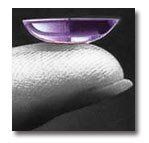PROFESSIONAL EYE CARE in a Personal Family Environment
CONTACT LENS FREQUENTLY ASKED QUESTIONS
Contact Lens Frequently Asked Questions
Contact lens prescriptions expire for the same reasons that medical prescriptions expire. Any time you are using a medical product, you should follow up with your doctor at least once per year to identify possible complications. The FDA considers contact lenses medical devices. In 2004, a law was passed that set the expiration date of contact lens prescriptions at one year, or the minimum required by state law.
Just because your eyes and vision seem perfect, that may not actually be the case.
Remember that a contact lens is a foreign body placed into your eye. It lies on top of the cornea — the clear, dome-like structure on the front part of your eye. Contact lenses interact with the inner tissue lining of the eye, called the conjuctiva, underneath your eyelids. They also interact with your tears.
While the cornea provides most of the refractive power of the eye, it is made of living, breathing cells. Metabolic processes occur every day in the cornea, just as in the rest of your body. Debris and waste material from the cells in the cornea are excreted. This material can sometimes build up unnecessarily underneath a tight-fitting contact lens, creating a toxic environment for your cornea.
Overwearing contact lenses can lead to lactic acid build-up within the cornea, resulting in swelling. When swelling occurs, the cells in the cornea may spread apart. Bacteria and viruses can more easily enter these potential spaces in the cornea, possibly creating infection and scarring. Overwearing contact lenses can also lead to oxygen deprivation; new blood vessels will begin to grow into the cornea to try to feed it the oxygen it needs.
It’s important that you are checked out to make sure that your lenses are not causing problems, and that your prescription is accurate for your current needs. The next time you reluctantly schedule a contact lens check, remind yourself that you are protecting your vision by maintaining the health of your eyes.
Source:
American Optometric Association. What You Need to Know About Contact Lens Hygiene & Compliance. AOA.com, 2006-09.

6110 W Kellogg Dr
Wichita, KS 67209
Phone: (316) 260-8788
Monday: 8:30-4:30
Tuesday: 8:30-5:30
Wednesday: 10-4:30
Thursday: 8:30-1:00*
Closed for Lunch: 1-2
.
Walk Ins Welcome
Call for an Appointment
316-260-8788
**We encourage you to call
to make an appointment.
Content, including images, displayed on this website is protected by copyright laws. Downloading, republication, retransmission or reproduction of content on this website is strictly prohibited. Terms of Use
| Privacy Policy
